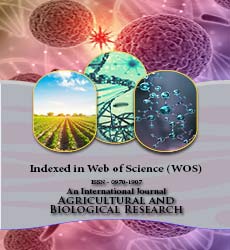Agricultural and Biological Research
RNI # 24/103/2012-R1
Albert Ukaro Ofuoku*, Precious Omesiri Abushe and Oghenekevwe Martha Enughure
This study was conceived to examine the coping strategies adopted by rural communities with flood driven food insecurity in delta state, Nigeria. While there are incidences of major flood every year in some communities, in other communities it happened every two years, every three years and every five years. The flood was very severe in all the locations because of the soil properties and the topography of the locations. Loss of fish (3.62 ± 0.21); submersion of natural ranching of and farming habitats (3.56 ± 0.33); destruction of crops (2.61 ± 0.51); disease outbreak (2.53 ± 0.42) loss of livestock (2.50 ± 0.48) and loss of home (2.51 ± 0.75 were experienced during flood. The incidences of flood affected food security. the communities used in this study popularity coped with flood event by constructing flood ways; adopting early maturing crops; relocating to either area not affected by flood or neighboring communities; diversifying their source of livelihood; constructing dykes around their fish pond; placing of sac bags around the farms and houses; keeping their valuable on shelves and tables; and transferring their valuables to relations/neighbors who live in advantaged area of the communities. It is therefore recommended that government should make effort to extend extension service to the study area so that they can benefit from their wealth of experience as well. Male farmers should help their wives in developing various strategies in coping with flood instead of going to urban settlement for employment and greener pasture when their families and properties are at risk. The trend of flooding should be studied and farming activities adjusted accordingly.
betkolik betlike betpark betticket betturkey extrabet holiganbet ilbet ikimisli imajbet jojobet kralbet mariobet marsbahis meritking milanobet piabet redwin süpertotobet tempobet
